“Who Dares to Claim: I Believe in God?”
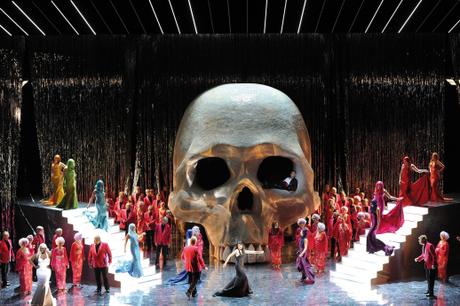 Act II, Scene Two of Mefistofele at Baden-Baden 2016 – with Erwin Schrott (Mefistofele) and Charles Castronovo (Faust)
Act II, Scene Two of Mefistofele at Baden-Baden 2016 – with Erwin Schrott (Mefistofele) and Charles Castronovo (Faust)
In most stage productions of Mefistofele, opera companies tend to merge the two scenes of Act II with the much shorter third act. For this post, however, we will maintain Arrigo Boito’s initial conception by keeping both acts separate.
Thus, the first scene of Act II takes place in a rustic garden — depicted either with an over-abundance of foliage in the romantic vein of an English countryside (as in Gounod’s Faust), or shown in surrealistic fashion with a lone, leaf-heavy tree (think: Samuel Becket’s Waiting for Godot).
The now youthful Faust enters, disguised as a nobleman behind a false name, Enrico (or Heinrich, in the original German). His tour guide through life, Mefistofele, has sought to grant Faust’s every whim. Recall that they are inextricably bonded together by the doctor’s signing of a pact with the Devil. As part of the deal, Faust endeavors to win the heart of the lovely maiden, Margherita (Marguerite in French, or Gretchen in Goethe’s play).
She speaks the first words, calling him a “wise and illustrious gentleman.” An inquisitive young woman, Margherita questions how a simple village girl such as herself can attract a person of his standing with her peasant talk. Faust replies that her ruby-colored lips pour forth words that are obviously of a higher order. Reaching out to her, Faust begs Margherita to continue, as he attempts to kiss her hand. Margherita modestly takes her hand back, imploring Faust not to kiss its rough exterior, yet continuing to refer to him as a “gentleman.”
Meanwhile, Mefistofele teasingly woos the elder maidservant, Marta (or Martha). What’s a Devil to do when faced with a tempting proposition such as this? Satan joins in the fun, musing on Faust’s light-hearted tryst with a girl. But the demon pictures a dark future for the learned physician, when old age finally catches up to him. Marta, on the other hand, believes the Devil is alluding to himself, and lightly brushes aside his bleak thoughts. They scuttle off to the side.
Returning to the scene, Faust implores Margherita to pardon the boldness with which his words have escaped his lips. He was only bewitched by the beauty of her face. Margherita answers that she was saddened and troubled with the thought that she is an immoral girl when she is nothing of the kind. “I have wept so much” she confesses, “so much! But your visage has remained imprinted on my heart!”
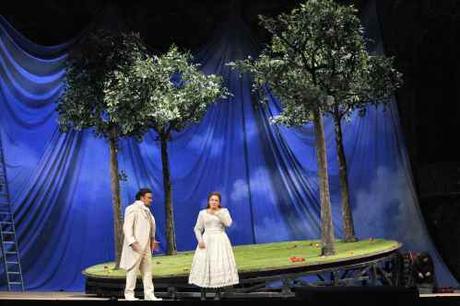
In the background, we hear Mefistofele and Marta cheerfully chuckling away at each other. Each couple is captivated by the other in their own peculiar manner. Faust follows Margherita into the garden in hot pursuit.
Mefistofele is left alone with the old biddy. He tells her of a saying he knows: “A good wife is a very rare thing.” Marta looks at him quizzically. “Indeed?” she asks. “Yes, indeed!” is the Devil’s reply. “And you haven’t fallen victim to the trap?” Marta inquires. Absolutely not! He claims to be ignorant of love. Marta is incredulous, of course, but Mefisto insists he knows not what love is. They wander off into the bushes.
As you might expect, the music for this scene is buoyant and airy, and pregnant with humorous touches in Boito’s polished use of woodwinds and strings — notably, those pizzicato strokes in the violins — as well as that mirthful bassoon. I well remember the American-born bass Samuel Ramey making quite a merry meal out of this scene. He mugged his way around the old girl to the audience’s delight.
When Margherita and Faust return, their conversation takes a turn toward the serious side. Margherita asks if he believes in religion. Faust would rather not discuss the topic, but the question betrays the girl’s concern for her lover’s spiritual side. Faust vows to give his life’s blood for her. She is not impressed. Margherita reveals herself to be wiser than her years. “One must believe in something,” she declares. “And you, Enrico, believe in nothing.” Despite her fondness for this handsome man, his nihilism has deeply affected her being.
In one of Boito’s most inspired passages — both lyrical and musical — Faust expounds on his philosophy of life (and why not? He is a philosopher by profession). “Colma il tuo cor d’un palpito, ineffabile e vero d’amor” (“Fill your heart with the true and indescribable thrill of love”) he reveals. Such intricately laced treatises as these, in opera, are especially tricky to put over. Audiences are left in the dark as to what the character is mulling about. An in-depth knowledge of the language is definitely called for. Today, supertitles and surtitles can clarify a character’s thought processes in simultaneous translation with what is being sung.
If nothing else, at the very least Faust is being true to himself and sincere in his beliefs — perhaps too sincere. “Who dares to claim that saying: I believe in God?” he posits. “The words of the saints make a mockery out of the truth that I seek. And what man would be so bold as to say: I do not believe?” If these impenetrable views were not accompanied by music of an impassioned nature, then Faust’s fervent air (and, by direct association, Boito’s personally held precepts) would not be as stirring to the soul.
Of the many extant recordings of this excerpt from Mefistofele, I find the versions recorded by tenors Antonio Melandri, Fernando De Lucia, Beniamino Gigli, Ferruccio Tagliavini, Giacinto Prandelli, Gianni Poggi, Plácido Domingo, Alfredo Kraus, Mario Del Monaco, Giuseppe Di Stefano, and Luciano Pavarotti to be quite stirring and characteristic of each singer’s individual style.
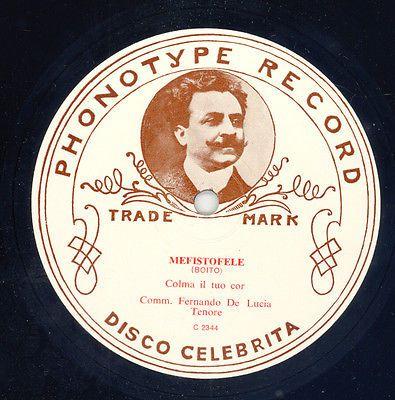
Upon concluding his reverie, Faust returns the favor by questioning whether Margherita is often alone at home. Lowering her eyes, she demurs ever so slightly. “I tend to the garden and housework,” she responds, “including the spinning wheel.” Her mother is demanding, to which Faust asks if they will never spend “one sweet hour of love” together. Margherita blushes as she explains that she does not sleep alone. Her mother is always close by. “If she heard you, I think I should die.” Indeed, she would. Faust tries to ease her mind. “Take this,” he proposes, pulling out a small vial from his vest. “Three drops of this potion will plunge your mother into the sweetest, most peaceful slumber.”
Margherita takes the vial. Reassuring her that no harm will come to her sainted mother, Faust and Margherita exchange sweet words of love. In the meantime, Marta and Mefistofele re-engage in witty repartee. Marta continues to doubt the Devil’s inexperience where love is concerned, whereas Mefistofele feigns ignorance of the emotion, still insisting that a good wife is a rare bird indeed. The music grows in intensity, pitting one couple’s amorous declarations (i.e. that of Faust and Margherita) against the other’s comic balking and taunting.
The couples scamper about the garden this way and that, catching up to and grabbing onto each other in mock seriousness, a pleasant game of tag or hide-and-seek. Their playfulness stands in sharp contrast to the hellish scenario about to be painted with the next sequence.
“Behold the World!”
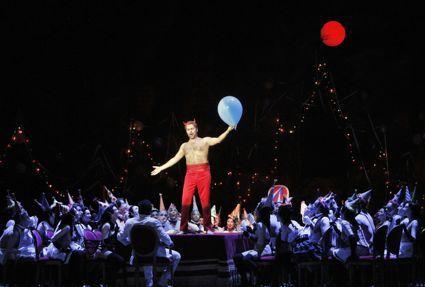
Scene Two of Act II is known as the Witches’ Sabbath. It takes place high up along the treacherous slopes of the Brocken, or Witches’ Mountain. With the darkly restless introduction sounding moodily in the orchestra, we immediately take notice of the change in mood by virtue of the coloration. A strong follower of the German school of composition, Boito took Carl Maria von Weber’s opera Der Freischütz (“The Free Shooter”) as his main inspiration, in particular the eerie Wolf’s Glen scene (which, by coincidence, also takes place in Act II of that work).
Rocky outcroppings and misty clouds pervade the atmosphere. A blood-red moon materializes in the night sky. We hear Mefistofele’s voice in the distance, urging Faust to come along and climb higher and higher, up the steep slope and to the mount of Old Satan himself. A bouncy melody surfaces in the orchestra and is picked up by Faust. It’s the will-‘o-the-wisp theme:
Folletto, folletto,
Veloce, leggier,
Che splendi soletto
Per l’erma sentier,
A noi t’avvicina,
Che buia è la china
Will-‘o-the-wisp
So airy and light,
Which shines alone
Along our lonely path
Approach us more closely
How gloomy is this slope
Mefistofele picks up the melody to form an amiable counterpoint to the tenor— a musical reprieve from the horrors to come. Harsh voices penetrate the fetid air. “Ascolta! Ascolta!” – “Listen! Listen!” Mefistofele entreats. “The coven of Hell is approaching!” And, in fact, the infernal legions begin to converge from all sides, and from every conceivable crevice. Witches, warlocks, and every demonic creature imaginable surround Faust and their ruler, the Devil. They dance around them in a mad frenzy.
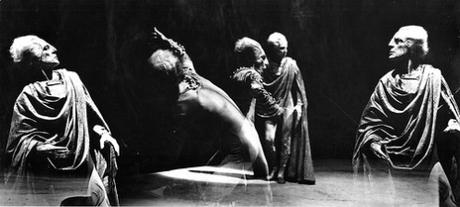
Indeed, Boito’s music reflects their dashing about the stage in wild, untamed abandon. Irish playwright and music critic George Bernard Shaw, under the pseudonym of Corno di Bassetto (i.e. “Bassett Horn”), barely disguised his distaste for this episode. He dismissed Boito as “an accomplished literary man without original musical gifts,” calling the Brocken Scene “ingenious tiddy-fol-lol” (whatever that is). Nevertheless, Mefistofele makes his way through the crowd of revelers, referring to them as “You putrid race devoid of all faith.” He commands that they adore him, that they bow “humbly” before the Devil.
Obediently, the witches, warlocks and demons prostrate themselves. “We grovel before Mefistofele,” they proclaim, “before our King.” A brief dance interlude now takes place. In the 1969 New York City Opera staging, directed by Tito Capobianco, several dancers from the corps de ballet were cast to follow Mefistofele around; one assumes they were part of his “retinue,” since they were all dressed in similar demonic fashion. Seating himself upon a rock-like throne, Mefistofele takes his rightful place among the hordes of worshippers. The crowd then offers him a tattered robe of state, along with a crystal globe of the earth.
Amid the chthonic goings-on, Faust is fawned over by eager wenches. The lower strings predominate in the orchestration, followed by lively toots in the flute section. Mefisto takes up the crystal globe and raises it high over his head. “Ecco il mondo!” – “Behold the world!” he touts. “Empty and round, rising and falling, it spins and glitters.” The Devil waxes poetic as he mocks the earth on its journey round the sun, “quaking and roaring, giving and destroying, now barren, now fertile, this is the world!”
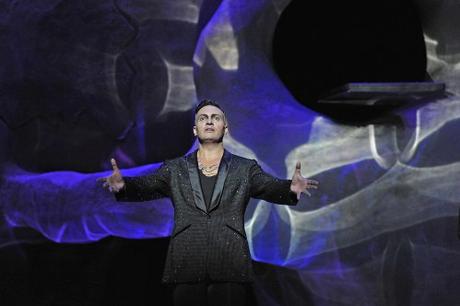
Next, he turns his attention to its embarrassing inhabitants: “There is a race, both foul and foolish, depraved and clever, forever and ever devouring itself; from the heights to the depths of this wicked world; a fatuous fable is Satan to them; Hell is a subject for mockery and ridicule, and to them even Paradise is subject to ridicule and mockery.”
Mefistofele laughs at his own impious conjectures until finally, in a peak of sarcasm, he gloats over the truths that he conceals from mankind. “Behold the world!” he roars, as the Devil hurls the object to the ground, smashing the globe into a thousand pieces. A high point in Boito’s drama, “Ecco il mondo,” along with the equally admired “Ave Signor” and “Son lo Spirito che nega,” has been a favorite with basses for over a century and a half. Worthy recorded interpreters of this piece include Fyodor Chaliapin (in a live 1920s performance from Covent Garden), Tancredi Pasero, Cesare Siepi, Giulio Neri, Nicola Rossi-Lemeni, Boris Christoff, George London, Nicolai Ghiaurov, Norman Treigle, Samuel Ramey, Ferruccio Furlanetto, Bryn Terfel, René Pape, and the great Ezio Pinza.
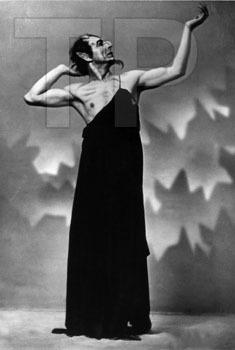
In his autobiography, ghost written with Robert Magidoff, Pinza recalled a particularly memorable performance of Mefistofele with his father in attendance. Worn down by a distended hernia, Pinza’s dad had to wear a heavy truss to keep the affliction from protruding. As Pinza’s voice began to climb higher and higher in an effort to hit the high note on the word “mondo” (a note he regularly had difficulty with), dad’s truss popped at that exact moment. Fortunately, dad was attended to by fellow audience members and the performance continued without further disruption.
In the meantime, all Hell has broken loose on stage. The wildness continues, with the dancing and celebration reaching a furious climax. At that moment, there is a pause in the action when Faust bursts out that a vision has come to him. “A girl, pale and sad, can you not see her? How slowly she walks, her feet in iron chains! Ah, the piteous vision, it seems to me the face of Margherita!”
Mefistofele’s demeanor changes from exalted ruler to panicked observer. “Turn your eyes away!” he charges. “That is some spectral temptress, a phantom, an ill-omen, a fantasy which casts a morbid spell into one’s heart. Turn your eyes, deluded soul, from the head of Medusa!”
The Devil knows, if the audience does not, that his bargain with the Heavenly Host may be at risk. If he allows the good doctor to linger over the ghostly apparition, and if Faust cries out “Stay, thou art beautiful,” the wager will be lost. Faust continues to describe the vision: “Those heavenly eyes stare wide, like the eyes of a corpse! I see her snow-white breast, which I so often bathed in kisses! It is she, Margherita! My angel, ah!”
“Torci il guardo!” – “Turn your eyes away!” the Devil repeats. Desperation starts to set in. Like his counterpart Lucifer in Milton’s Paradise Lost, Mefistofele prefers to reign in Hell than to serve in Heaven. But his warnings to Faust to look away have the opposite effect. Nearly delirious, Faust sees a strange band encircling the girl’s throat, a blood-red line.
Mefistofele mutters aloud to one and all: “Her head’s been cut off! Perseus did it!” an allusion to the slayer of the Gorgon, Medusa. The scene ends with more wildness and abandon. Witches, warlocks, demons, imps, and elves run hither and yon. “It’s the Sabbath! It’s the Sabbath!” they shout with fiendish glee. The whole chorus and orchestra rise to the occasion. Act II comes to a rousing close.
End of Act Two
(To be continued…)
Copyright © 2017 by Josmar F. Lopes
Advertisements
